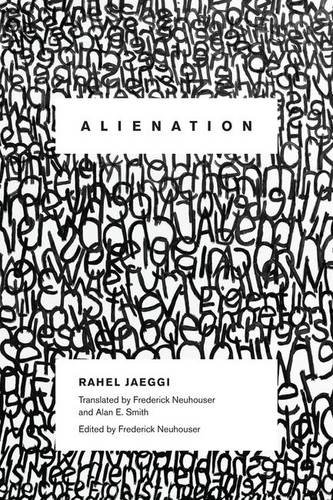
Alienation
New Directions in Critical Theory
- اطلاعات
- نقد و بررسی
- دیدگاه کاربران
نقد و بررسی

August 4, 2014
This lucid first book from Jaeggi reconceives the philosophical concept of alienation, claiming that alienation is not the absence of a relation but rather is "a relation of relationlessness." This intervention is coupled with the provocative assertion that the subject does not contain a true inner self. Instead, identity is realized through one's participation in the world and with others, through actions, commitments, projects, and relationships. Alienation is the inability to properly appropriate these engagements or identify with one's own life. Through the question of alienation the book opens a broad philosophical inquiry into what it means to be a human being and to have sovereignty over one's life. Jaeggi develops her thesis through an array of phenomenological descriptions and case studies, bolstering the work through a rich dialogue with the history of alienation from its Marxist-Hegelian conception to formulations in contemporary analytic and continental philosophy. Although succinct, at points the book's clarity sacrifices a more thorough investigation of certain lines of thinking (possibly because the book is a revised version of Jaeggi's dissertation), though in the foreword Axel Honneth avers that this shortcoming is rectified in her second (as yet untranslated) book. Nevertheless, Jaeggi's treatise is an intriguing contribution to the study of alienation.

July 1, 2014
Jaeggi (social and political philosophy, Humboldt Univ. of Berlin) offers a comprehensive philosophical analysis of the concept of alienation. She calls alienation a "relation of relationlessness" and shows that there have been two customary ways of analyzing this concept. One of these, found in Karl Marx, looks at alienation as interference with the powers of the human species to find expression. The other, found in Soren Kierkegaard and Martin Heidegger, emphasizes the inability to lead an authentic life. Jaeggi next turns to phenomenology, offering a description of several people who led alienated lives. With this preparation, the author is now in position to present her own view of alienation: she sees it as an inability to appropriate one's own life. In developing her view, Jaeggi discusses the views of leading analytic philosophers such as Thomas Nagel and Richard Rorty. She finds in Rorty too sharp a separation between the private "authentic" self and the self in its social relations; it is clear that for her the relation of self and society is central to understanding alienation. In taking this view, she has been influenced by Georg Wilhem Friedrich Hegel, and her book can in part be read as a reworking of Hegel's thought. VERDICT This insightful and learned book will appeal to anyone interested in social philosophy.--David Gordon, Bowling Green State Univ., OH
Copyright 2014 Library Journal, LLC Used with permission.




دیدگاه کاربران